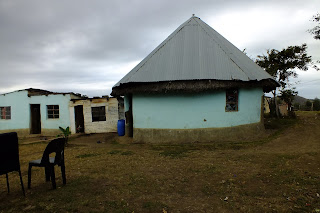 |
| Port St Johns |
Since the beginning of last year (2017), we have been running a project at work that has taken me to places I am sure I wouldn't otherwise have been. And even in some of my favourite places, it has introduced me to a world of perspectives I hadn't stepped into before.
 |
| Port St Johns |
We are working with small scale fishing communities in the four coastal provinces of South Africa. If you want to know more about the actual project, you can check out the website. It is a great project, (which I am allowed to say because I didn't design it so it isn't arrogant) we have trained members of various communities to run the workshops, so the workshops are held in the local language, our trainers have a source of (intermittent) income and the participants have someone who understands them and their challenges speaking to them and encouraging them to be more environmentally responsible (and why - which is crucial because one comment I have heard often is that people tell them what to do, but don't explain why).
 |
| En route to Kleinmond |
Meeting the people from these communities has been an amazing and humbling experience. Many of the people who come to our workshops didn't finish school, struggle to read and write and almost all are unemployed (at least in any formal sense), and yet they are all so eager to participate and learn and share their own knowledge.
 |
| Mtambalala, the rondawel was the kitchen of the home we used for the Mtambala course (there was also a modern kitchen in the main house). |
The communities face challenges I can't even imagine, and yet they welcome us and in at least one case - literally opened their home to us to hold a workshop (see picture alongside). I have stood, feeling very small and undeserving, while women have hugged me, with tears in their eyes, and thanked me for the workshops we have held (mostly women hug - men mostly express gratitude with handshakes). I think their gratitude isn't about the content of the workshop, so much as the acknowledgement of their community as being worthy of visiting and having workshops in. It makes me feel awkward and embarrassed because they deserve so much more.
 |
| Hole in the Wall (near Coffee Bay) |
 |
| Port St Johns does have waste management, but it isn't without its mess |
 |
| En Route to Port Nolloth |
It is also interesting to speak to people and hear how differently they see the world. From believing (I think seriously - but sometimes I wonder if they say things to shock the white girl) that tornadoes are giant snakes sent to punish sinners (tut tut JHB), or that rock lobster eggs will make your cows extra fertile. It is a big leap to adjust my science-biased thinking to be relevant to these communities. And it is so hard for me to put away my emotions and privilege to not judge someone saying they eat albatross, turtles or seals, after all, if you are hungry, how is there a moral difference between that and eating fish? (Even if you aren't hungry - there is a sustainability difference, but an animal is an animal, cow or turtle or dolphin...) Having said that, once we explain that albatross live long lives, mate for life and breed slowly, the albatross-eater did say he wouldn't eat them again... We can hope. (The mate for life thing impresses people).
It is so wonderful to be meet people from such a different South Africa to mine. And it is such a privilege to work with our wonderful trainers, who have such big hearts. I recently watched possibly my first ever Carte Blanche episode, (house sitting and enjoying the novelty of TV) only to see one of our trainers featured for work she is doing with to uplift community spirit in Port St Johns. Our trainers are wonderfully passionate, caring and kind people and I feel honoured to have had a chance to get to know them this year (all of them are looking for work too, if you need articulate passionate people to liaise with communities around South Africa - give us a shout).
 |
| Dogs, goats, chickens, even horses and donkeys are common features of the workshop venues. |
 South Africa is big, diverse and beautiful and I love getting to see it in a different way (frequently fairly rushed and with little time for exploration beyond the workshop venue). I look forward to what else it has to offer (and please feel free to plant trees on my behalf, I am having serious carbon-footprint-guilt.) Next stop Boesmansrivier...
South Africa is big, diverse and beautiful and I love getting to see it in a different way (frequently fairly rushed and with little time for exploration beyond the workshop venue). I look forward to what else it has to offer (and please feel free to plant trees on my behalf, I am having serious carbon-footprint-guilt.) Next stop Boesmansrivier...




